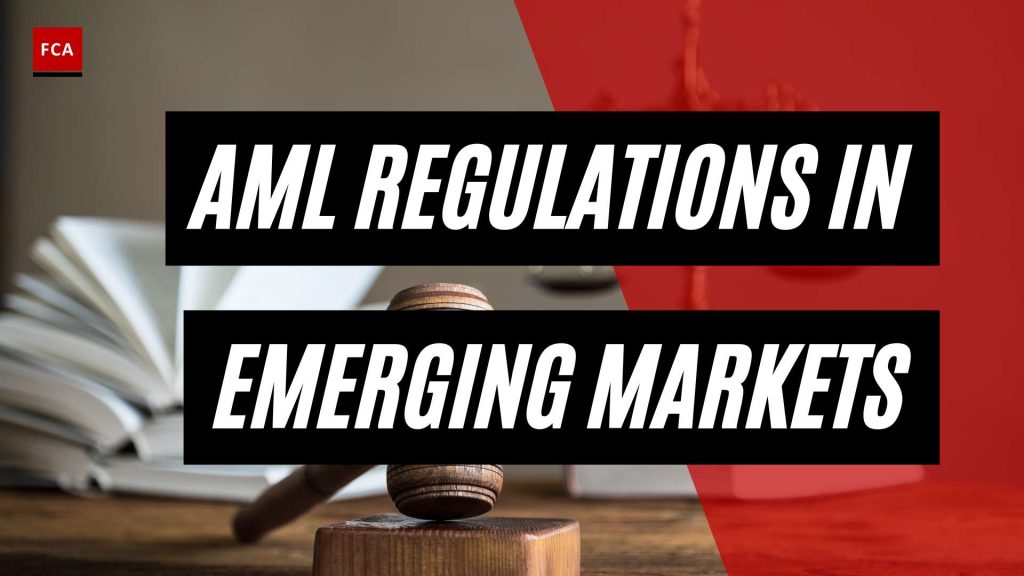Understanding AML Regulations
In today’s global financial landscape, Anti-Money Laundering (AML) regulations play a critical role in combating illicit financial activities. Understanding AML regulations is essential for organizations operating in emerging markets to effectively manage risks and ensure compliance. This section will provide an overview of AML and highlight the importance of an AML compliance framework while discussing the challenges faced in AML compliance.
What is Anti-Money Laundering (AML)?
Anti-Money Laundering (AML) refers to a set of laws, regulations, and procedures designed to prevent the illegal process of concealing the origins of illicitly obtained funds. AML regulations aim to detect and deter money laundering, terrorism financing, and other financial crimes by establishing robust control measures and reporting mechanisms.
Money laundering involves transforming the proceeds of criminal activities into legitimate funds by disguising their true origins. AML regulations require financial institutions and designated non-financial businesses to implement strong due diligence measures, reporting systems, and internal controls to identify and report suspicious transactions.
Importance of AML Compliance Framework
The establishment of an effective AML compliance framework is crucial for organizations operating in emerging markets. By implementing a comprehensive framework, companies can mitigate the risks associated with money laundering and terrorist financing, protect their reputation, and avoid legal and financial penalties.
An AML compliance framework typically includes policies, procedures, and controls that facilitate the detection, prevention, and reporting of suspicious activities. It involves the implementation of customer due diligence (CDD) measures, ongoing monitoring of customer transactions, and the development of a risk-based approach tailored to the specific characteristics of emerging markets.
Challenges in AML Compliance
AML compliance in emerging markets presents unique challenges due to various factors, including limited regulatory oversight, weak financial infrastructure, and cross-border transactions. These challenges can hinder the effective implementation of AML measures and increase the vulnerability of the financial system to illicit activities.
| Challenges in AML Compliance in Emerging Markets |
|---|
| Limited Regulatory Oversight |
| Weak Financial Infrastructure |
| Cross-Border Transactions |
Limited Regulatory Oversight: Emerging markets may have less mature regulatory frameworks compared to established financial centers. This can result in weaker enforcement, inadequate resources, and gaps in regulatory supervision, making it easier for illicit activities to go undetected.
Weak Financial Infrastructure: Developing financial infrastructure in emerging markets can pose challenges in implementing robust AML controls. Limited access to technology, lack of standardized procedures, and insufficient data collection and sharing mechanisms can hinder the effectiveness of AML compliance efforts.
Cross-Border Transactions: Emerging markets often engage in cross-border transactions, which increase the complexity of AML compliance. Diverse regulatory requirements, differing legal systems, and challenges in international cooperation can create loopholes for criminals to exploit.
To address these challenges, organizations operating in emerging markets need to develop tailored AML compliance strategies, strengthen regulatory frameworks, promote collaborative efforts, and leverage technology solutions. These strategies will be explored in detail in the subsequent sections.
Understanding AML regulations and the challenges associated with AML compliance in emerging markets is crucial for organizations to proactively mitigate risks and ensure the integrity of their financial systems. By doing so, businesses can contribute to the global fight against money laundering and terrorist financing while maintaining the trust of their stakeholders.
AML Compliance in Emerging Markets
Emerging markets play a significant role in the global economy, attracting investments and fostering economic growth. However, these markets also present unique challenges when it comes to Anti-Money Laundering (AML) compliance. Understanding the specific dynamics of AML regulations in emerging markets is crucial for organizations operating in these regions. In this section, we will explore the overview of emerging markets, the unique AML challenges they face, and the regulatory framework in place.
Overview of Emerging Markets
Emerging markets, also known as developing economies, are characterized by rapid economic growth and industrialization. These markets encompass a diverse range of countries, each with its own political, social, and economic landscape. Examples of emerging markets include countries in Asia, Africa, Latin America, and the Middle East.
In these markets, financial systems are evolving, and regulatory frameworks are still developing. As a result, AML compliance can be particularly challenging due to factors such as limited resources, weak infrastructures, and varying levels of regulatory oversight.
Unique AML Challenges in Emerging Markets
AML compliance in emerging markets presents several unique challenges. These challenges can stem from factors such as high levels of corruption, informal economies, and inadequate enforcement mechanisms. Some of the key challenges include:
-
Limited Regulatory Oversight: Emerging markets may have limited regulatory oversight and enforcement capabilities. This can pose challenges in effectively detecting and preventing money laundering and terrorist financing activities.
-
Weak Financial Infrastructure: Financial systems in emerging markets may have weak infrastructure, making it difficult to implement robust AML controls. This can include issues with customer due diligence, transaction monitoring, and reporting systems.
-
Cross-Border Transactions: Emerging markets often engage in cross-border transactions, which can complicate AML compliance efforts. Money laundering and illicit financial activities may exploit the differences in regulations and jurisdictions between countries.
Regulatory Framework in Emerging Markets
Emerging markets are working towards establishing comprehensive regulatory frameworks to address AML concerns. Regulatory bodies and government agencies are actively collaborating with international organizations and adopting global AML standards and guidelines.
The regulatory framework in emerging markets typically includes laws and regulations that require financial institutions, designated non-financial businesses, and professions to implement AML measures. These measures may include customer due diligence, transaction monitoring, reporting suspicious activities, and implementing compliance programs.
To ensure compliance with the regulatory framework, organizations operating in emerging markets should stay updated on the AML regulations specific to each country. This includes understanding the regulatory requirements, reporting obligations, and guidelines provided by the local regulatory authorities.
By navigating the unique AML challenges and understanding the regulatory landscape in emerging markets, organizations can establish effective AML compliance programs that align with local regulations. Implementing robust compliance measures is crucial for mitigating risks and maintaining the integrity of financial systems in these dynamic markets.
Key Challenges in AML Compliance in Emerging Markets
As emerging markets continue to grow and attract investment, it is crucial to address the unique challenges they face in Anti-Money Laundering (AML) compliance. These challenges can hinder the implementation of effective AML measures and increase the risk of financial crimes. This section explores three key challenges in AML compliance that are prevalent in emerging markets: limited regulatory oversight, weak financial infrastructure, and cross-border transactions.
Limited Regulatory Oversight
One of the primary challenges in AML compliance in emerging markets is the limited regulatory oversight. These markets may have less mature regulatory frameworks compared to developed economies. As a result, there may be gaps in AML regulations, enforcement, and supervision. This can create an environment where illicit activities can thrive, putting the financial system at risk.
To address this challenge, emerging markets need to focus on strengthening their regulatory frameworks by developing comprehensive AML laws and regulations. It is essential to establish independent regulatory bodies with the authority to oversee and enforce compliance with AML measures. Additionally, collaboration with international organizations and sharing of best practices can help these markets enhance their regulatory oversight.
Weak Financial Infrastructure
Weak financial infrastructure is another significant challenge in AML compliance in emerging markets. This includes issues such as inadequate technological systems, limited resources, and a lack of skilled professionals. These factors can hinder the implementation of robust AML controls and monitoring mechanisms.
To overcome this challenge, emerging markets need to invest in upgrading their financial infrastructure. This involves adopting modern technologies and systems that enable efficient customer due diligence, transaction monitoring, and suspicious activity reporting. Furthermore, investing in training programs and capacity building can help develop a skilled workforce equipped to handle AML compliance effectively.
Cross-Border Transactions
Emerging markets often experience a high volume of cross-border transactions, which can pose significant challenges in AML compliance. Money laundering and other financial crimes can easily be concealed within complex international transactions, making it difficult to detect illicit activities.
To address this challenge, emerging markets should enhance their collaboration with international counterparts, including sharing information and intelligence. Implementing effective cross-border cooperation mechanisms, such as mutual legal assistance treaties and information exchange agreements, can help mitigate the risks associated with cross-border transactions. Additionally, leveraging advanced technologies and data analytics can aid in identifying suspicious patterns and anomalies across diverse jurisdictions.
By recognizing and addressing these key challenges, emerging markets can strengthen their AML compliance efforts and protect their financial systems from illicit activities. A comprehensive and risk-based approach is essential, considering the specific characteristics and dynamics of each market. Implementing robust AML measures, investing in technology and infrastructure, and fostering international collaboration can contribute to more effective AML compliance in emerging markets.
Strategies for Effective AML Compliance in Emerging Markets
To effectively address the unique challenges of Anti-Money Laundering (AML) compliance in emerging markets, organizations must implement strategic measures. Strengthening regulatory frameworks, enhancing collaborative efforts, and leveraging technology solutions are key strategies that can help mitigate the risks associated with money laundering activities.
Strengthening Regulatory Frameworks
In emerging markets, it is crucial to establish robust regulatory frameworks to combat money laundering effectively. This involves creating and enforcing comprehensive AML laws and regulations that align with international standards. Regulators need to ensure that financial institutions operating in these markets have clear guidelines to follow. By enhancing regulatory oversight and enforcement, emerging markets can strengthen their AML compliance efforts and deter illicit financial activities.
Enhancing Collaborative Efforts
Collaboration among various stakeholders is essential for effective AML compliance in emerging markets. Governments, regulatory bodies, financial institutions, and law enforcement agencies should work together to share information, intelligence, and best practices. Establishing public-private partnerships can facilitate the exchange of knowledge and resources, enabling a more coordinated approach to combating money laundering. By fostering collaboration, emerging markets can enhance their ability to detect and prevent financial crimes.
Leveraging Technology Solutions
Technological advancements play a crucial role in enhancing AML compliance in emerging markets. The adoption of innovative solutions can streamline compliance processes, improve risk assessments, and enhance transaction monitoring capabilities. Technology-based tools such as artificial intelligence, machine learning, and data analytics can help identify suspicious activities more efficiently. This enables financial institutions to detect potential money laundering patterns and take appropriate action. Implementing robust AML software systems and automated monitoring tools can significantly strengthen compliance efforts.
| Technology Solutions | Benefits |
|---|---|
| Artificial Intelligence (AI) | – Improved detection of suspicious activities – Enhanced risk assessments – Streamlined compliance processes |
| Machine Learning (ML) | – Accurate identification of money laundering patterns – Real-time monitoring and alerts – Reduced false positives |
| Data Analytics | – Deeper insights into customer behavior – Enhanced transaction monitoring – Improved reporting and compliance documentation |
By leveraging technology solutions, emerging markets can improve the efficiency and effectiveness of their AML compliance programs.
Effective AML compliance in emerging markets requires a multi-faceted approach. Strengthening regulatory frameworks, fostering collaboration, and embracing technology solutions can significantly enhance the ability to detect, prevent, and mitigate money laundering risks. However, it is important to regularly review and update these strategies in response to evolving AML compliance guidelines and trends. By staying vigilant and proactive, emerging markets can create a robust AML compliance environment that contributes to the integrity of their financial systems.
Future Trends and Best Practices
As anti-money laundering (AML) regulations continue to evolve, it is crucial for emerging markets to stay updated and implement effective compliance measures. The future of AML in emerging markets will be shaped by regulatory evolution, the importance of continuous monitoring, and the development of a risk-based approach.
Regulatory Evolution in Emerging Markets
Emerging markets are dynamic environments with evolving financial landscapes. As these markets grow and mature, regulatory bodies recognize the need to adapt AML regulations to address emerging risks and challenges. Regulatory evolution involves revisiting and enhancing existing AML frameworks to keep pace with changing financial activities and illicit practices. This ensures that emerging markets can effectively combat money laundering and terrorist financing activities.
To stay compliant, financial institutions operating in emerging markets must keep a close eye on regulatory updates and actively participate in industry consultations. By doing so, they can proactively implement necessary changes to their AML programs and maintain robust compliance frameworks.
Importance of Continuous Monitoring
Continuous monitoring is a key practice in effective AML compliance, especially in emerging markets. Given the rapidly changing financial landscape and the evolving sophistication of money laundering techniques, periodic reviews and static risk assessments may not be sufficient. Continuous monitoring allows financial institutions to detect and respond to suspicious transactions and activities in real time.
By leveraging advanced technologies and analytics, financial institutions can monitor customer transactions, behavior patterns, and emerging risks more effectively. Continuous monitoring improves their ability to identify potential red flags, flag suspicious activities, and promptly report them to the relevant authorities. This proactive approach strengthens the overall AML compliance framework and enhances the detection and prevention of money laundering activities.
Developing a Risk-Based Approach
A risk-based approach is a fundamental principle in AML compliance, and it becomes even more critical in emerging markets. Financial institutions need to assess and understand the specific AML risks they face within these markets. This includes factors such as the prevalence of cash-based transactions, weak financial infrastructures, and cross-border transactions.
Developing a risk-based approach involves conducting thorough risk assessments, identifying high-risk areas, and implementing tailored controls and mitigation strategies. By focusing resources on areas with higher inherent risks, financial institutions can allocate their efforts more effectively and efficiently. This approach enables them to prioritize their AML efforts and strengthen their ability to detect and prevent money laundering activities.
To support the development of a risk-based approach, regulatory bodies in emerging markets often issue guidelines and requirements. Financial institutions should closely follow these guidelines to align their compliance efforts with industry best practices and regulatory expectations.
As emerging markets continue to grow and evolve, so too will the AML landscape within these markets. By staying abreast of regulatory changes, embracing continuous monitoring practices, and adopting a risk-based approach, financial institutions can navigate the challenges of AML compliance successfully. These future trends and best practices will help ensure that emerging markets maintain robust AML frameworks and contribute to the global fight against money laundering and financial crime.








